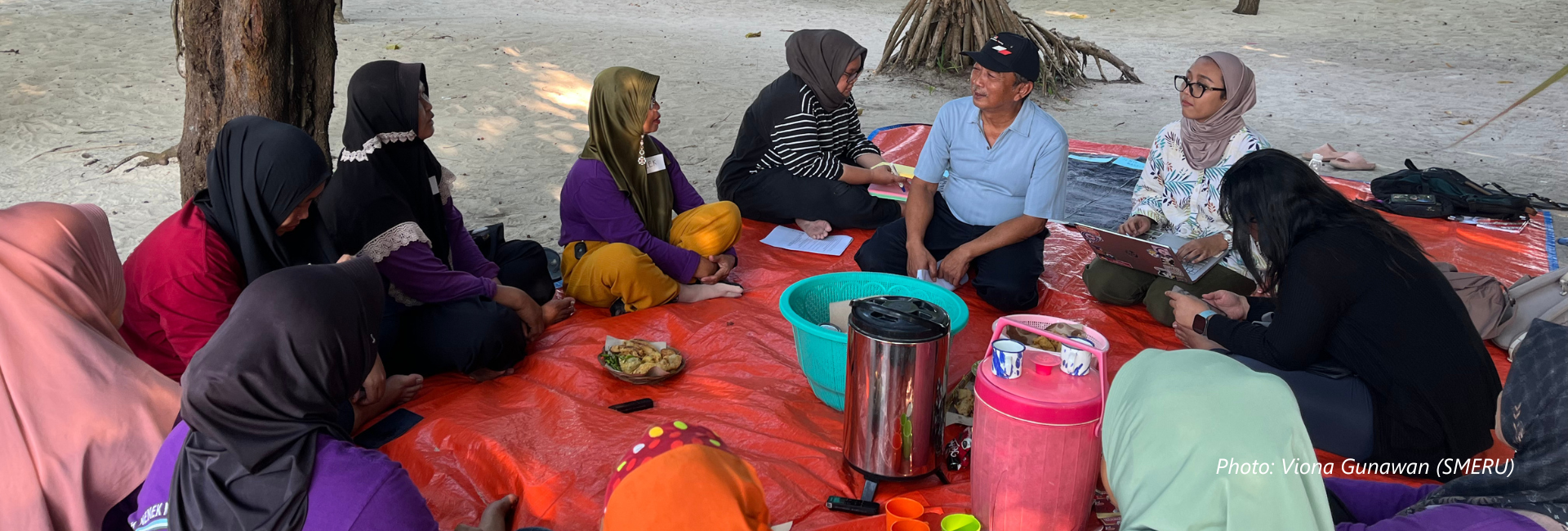Jakarta is among the regions most vulnerable to the global climate crisis due to its location on the coast and at the mouth of a river. This vulnerability extends to surrounding areas such as Bogor, Depok, Tangerang, Bekasi, and Cianjur (Jabodetabekjur), exacerbated by poor spatial planning and the loss of water catchment zones.
Marginalized groups such as residents of Pari Island, Marunda, and Bantar Gebang experience the impacts of the climate crisis firsthand and on multiple fronts from coastal erosion and crop failures to exposure to pollution and limited access to basic services. On Pari Island, the marine ecosystem has been damaged by reclamation projects. Local residents are working to rehabilitate coastal ecosystems, particularly mangroves, but their efforts are hindered by exploitative development such as island reclamation and luxury resort projects. In Marunda, coal dust threatens the health of public housing residents. They need a transition to renewable energy and more responsive healthcare services. Meanwhile, in Bantar Gebang, children of waste pickers struggle to access education. The SAKA community steps in to empower these children through soft skills training and circular-economy-based waste processing.
However, these efforts are still hindered by policies that prioritize economic interests over social and environmental protection, as well as by the lack of recognition for communities’ roles in resource management and risk mitigation. It is therefore crucial to promote community-centered collaborative research to identify and develop sustainable, context-specific solutions.
The approach boosts community resilience and drives policy advocacy at local and national levels. With proper regulatory backing, grassroots climate solutions can be strengthened, replicated, and scaled to ensure a fair and inclusive transition.
SMERU partners with Greenpeace Indonesia to undertake comprehensive research that focuses on socio-economic aspects across all study sites. SMERU’s role covers research design, primary and secondary data collection, data processing and analysis, report writing, and research dissemination.
Greenpeace Indonesia and SMERU will share the findings widely through reports and social media campaigns to achieve the following impacts:
- Raise awareness and support for grassroots initiatives addressing the climate and environmental crises, especially among civil society, donors, the media, and policy stakeholders.
- Spark discussions among experts and policymakers on the need for inclusive, community-based environmental governance, and the importance of integrating community-led solutions into national and local climate mitigation and adaptation strategies.
The study seeks to:
- Identify and examine alternative solutions proposed by focal communities in addressing the climate and environmental crisis.
- Evaluate the implementation, effectiveness, and sustainability of these solutions.
- Provide policy and regulatory recommendations to support successful implementation and expansion.
- Promote community-based solutions to generate wider public impact, including raising awareness, fostering social movements, and advancing climate justice regulations.
This study explores alternative solutions developed by communities to address the climate crisis. In addition to examining how these solutions are implemented, it assesses their alignment with environmental, social, and economic aspects.
To achieve this, the study adopts a mixed-methods approach. Qualitative methods are applied to gain a deeper understanding of local contexts and community solutions, while quantitative methods are used to validate the local context identified through the qualitative phase by using sectoral data, demographic data at the subdistrict level, and satellite data.




